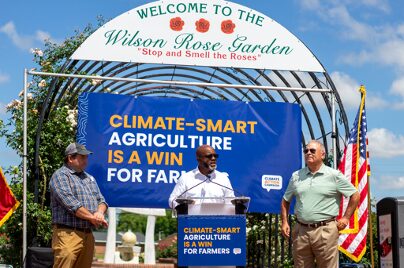North Carolina Officials, Agriculture Leaders, and Local Farmers Underscore Continued Need for Critical Federal Funding to Combat Climate Change

Speakers call on federal officials to oppose any attempts to reduce investments in climate smart agricultural programs
(Wilson, NC) – Today, North Carolina public officials, farmers, and agriculture leaders convened a press conference to demonstrate how the federal Inflation Reduction Act (IRA), signed into law in 2022 by President Biden, is now providing critical funding for farmers to help them mitigate the dire impacts of climate change. Speakers highlighted the ways in which the IRA law is increasing climate-smart agricultural practices while bolstering North Carolina’s robust agricultural economy.
“These funds are essential,” said Rep. Eric Ager (NC-114), a prominent advocate for
sustainable agriculture and the former Director of Business Operations at Hickory Nut Gap Farm. “They enable more farmers to access programs that have been underfunded and oversubscribed until now. This financial support is crucial for our farmers to afford and implement sustainable practices, helping to reduce pollution. Given the high demand for these technologies, this funding comes at a critical time.”
The agriculture sector is both contributing to and suffering from the effects of the climate crisis. More frequent and intense storms, drought, air pollution, and other climate-related impacts are resulting in crop loss, land degradation, unhealthy conditions for farmworkers, higher costs to farmers and ranchers, greater challenges for communities experiencing food insecurity, and more unpredictable seasons affecting planting and harvest. At the same time, the agriculture sector itself accounts for 11% of the carbon pollution in the United States.
“The Inflation Reduction Act is pivotal for our rural communities,” said Rep.-Elect Rodney D. Pierce (NC-27). “It not only supports the adoption of sustainable practices that will benefit our entire region’s environment, but also drives job creation in our rural communities. By investing in renewable energy and conservation methods, we are ensuring a sustainable future for our agriculture economy while driving economic growth.”
In North Carolina, agriculture is a significant economic driver, contributing over $103 billion annually and employing nearly 1 in 5 North Carolinians. The state’s agriculture sector faces increasing challenges from climate change, including more frequent extreme weather events and shifts in growing seasons, which necessitate robust adaptation measures.
“The climate-smart programs funded by the IRA are invaluable,” said R.C. Hunt, a local farmer and a past president of the National Pork Producers Council. “These programs benefit North Carolina hog farmers as we seek to preserve our land and reduce our carbon footprint, ensuring we can continue to operate sustainably for generations to come.”
The IRA designates nearly $40 billion to climate-smart agricultural initiatives, including about $19.5 billion to enhance conservation methods like low-till farming and carbon sequestration. An additional $14 billion encourages rural communities to adopt renewable energy sources, fostering both job growth and a cleaner environment.
Please find a full recording of the event HERE.


